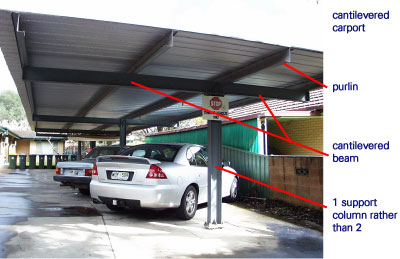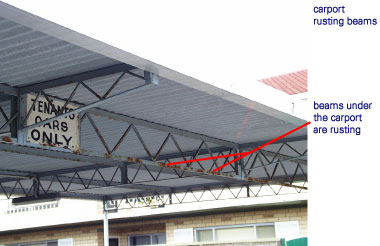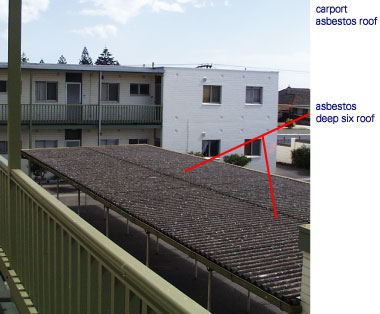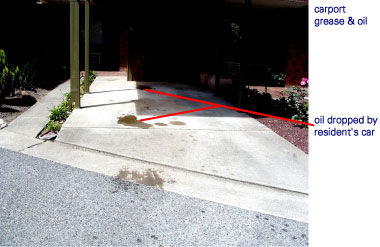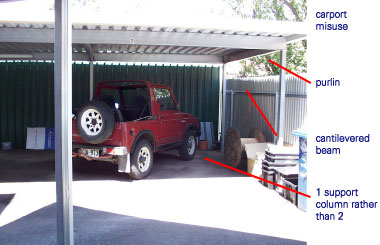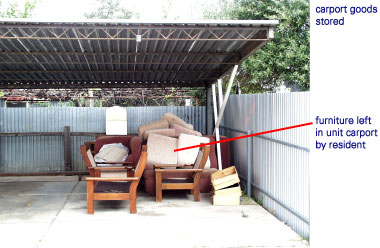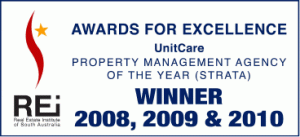Maintenance: Carports
Strata Titles Act (plan number less than 20,000)
Carports are common property, the unit holder owns the space if it is designated a unit subsidiary on the strata plan. see Boundaries
Section 25. The functions of the strata corporation are as follows:
(a) to administer and maintain the common property for the benefit of the unit holders and, to such extent as may be appropriate, other members of the strata community; and
(b) to administer all other property of the corporation
What does this mean?
The strata corporation must maintain the common property.
Hint
See the Boundary chapter for the definition of Common property
Community Titles Act
Strata Division (one lot above another)
Carports are common property, the unit holder owns the space if it is designated a unit subsidiary on the plan. see Boundaries
Section 75—Functions and powers of corporations
(1) The functions of a corporation are—
(a) to administer, manage and control the common property for the benefit of the
owners of the community lots; and
(b) to maintain the common property and the property of the corporation in good
order and condition;
What does this mean?
Carports/garages on community titled Strata Divisions are treated the same as a Strata Titled group. The corporation owns the structure with the lot owner having title to any space designated lot subsidiary.
For regular lot by lot Community Corporations each lot owner has ownership of the carport/garage on their lot. They are responsible for its maintenance.
Strata Titles Act (plan number less than 20,000)
Strata Corporations have the power for enforce the orders it and other authorities make. The orders can include notice to an owner to cleanup their carport. Section 28 of the Strata Titles Act spells out the Corporation’s powers.
Section 28. Power to enforce duties of maintenance or repair:
28. (1) A strata corporation may, by notice in writing to a unit holder, require the unit holder:
(a) to carry out specified work in pursuance of a duty of maintenance or repair imposed on the unit holder by the articles;
(b) to carry out specified work to remedy a breach of this Act or the articles on the part of the unit holder, a former unit holder, or an occupier or former occupier of the unit;
(c) to carry out specified work required to be carried out on the unit by a public authority or council.
(2) If the unit holder does not comply with a requirement imposed under this section within the time allowed in the notice, a person or persons authorised by the strata corporation may (using such force as may be reasonably necessary in the circumstances) enter the unit and carry out the specified work.
(3) A power of entry must not be exercised under subsection (2) unless the unit holder has been given reasonable notice of the proposed entry.
(4) Any cost reasonably incurred by the strata corporation in having work carried out under this section may be recovered as a debt from the unit holder.
(5) Where—
(a) the strata corporation recovers costs from a unit holder under subsection (4); and
(b) the circumstances out of which the work was required are attributable to the act or default of another person,
the unit holder may in turn recover those costs from that other person as a debt.
What does this mean?
There is no excuse for putting up with poorly kept carports.
Community Titles Act
Community Corporations have the power for enforce the orders it and other authorities make. The orders can include notice to an owner to clenup their carport. Section 101 of the Community Titles Act spells out the Corporation’s powers.
101—Power to enforce duties of maintenance and repair etc
(1) A community corporation may, by notice in writing to the owner of a lot, require the owner:
(a) to carry out specified work in pursuance of a duty of maintenance or repairimposed on the owner by this Act or the by-laws;
(b) to carry out specified work to remedy:(i) a breach of this Act or the by-laws by the owner or a former owner or an occupier or former occupier of the lot; or
(ii) a situation that is likely to result in a breach of this Act or the bylaws;(c) to carry out specified work required to be carried out on the lot by a council or other public authority.
(2) Subject to subsection (4), if the owner of a lot does not comply with a requirement imposed under this section within the time allowed in the notice, a person or persons
authorised by the corporation may (using such force as may be reasonably necessary in the circumstances) enter the lot and carry out the specified work.(3) A power of entry must not be exercised under subsection (2) unless the owner of thelot has been given reasonable notice of the proposed entry.
(4) A person must not use force to enter a strata lot or a building on any other lot under subsection (2) except pursuant to an order of the Magistrates Court authorising the
entry.(5) Any cost reasonably incurred by the corporation in having work carried out under this section may be recovered as a debt from the owner of the lot.
(6) Where:
(a) (i) the owner of a lot incurs costs in complying with a notice under subsection (1); or (ii) the corporation recovers costs from the owner of a lot under subsection (5); and
(b) the circumstances out of which the work was required are attributable to the act or default of another person, the owner of the lot may recover those costs from that other person as a debt.
(7) Where a community parcel is subject to a leaseback arrangement, this section applies to, and in relation to, the lessee instead of the owners of the community lots.
Section 75—Functions and powers of corporations
(1) The functions of a corporation are—
(a) to administer, manage and control the common property for the benefit of the owners of the community lots; and
(b) to maintain the common property and the property of the corporation in good order and condition; and
(d) to enforce the by-laws and the development contracts (if any);
What does this mean?
There is no excuse for putting up with poorly kept carports. The Community Corporation has the power to order and undertake rectification.


